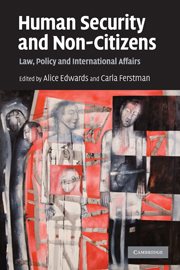Book contents
- Frontmatter
- Contents
- About the editors
- About the contributors
- Preface
- Acknowledgements
- Part I Human security, human rights and human dignity
- Part II Physical and legal security, armed conflict and refuge
- Part III Migration, development and environment
- Part IV National security and the ‘war on terror’
- 12 A distinction with a legal difference: the consequences of non-citizenship in the ‘war on terror’
- 13 Immigration law enforcement after 9/11 and human rights
- 14 Protection of non-citizens against removal under international human rights law
- 15 The human security framework and counter-terrorism: examining the rhetoric relating to ‘extraordinary renditions’
- 16 Legal routes to restoring individual rights at Guantanamo Bay: the effectiveness of habeas corpus applications and efforts to obtain diplomatic protection
- Index
14 - Protection of non-citizens against removal under international human rights law
Published online by Cambridge University Press: 17 February 2011
- Frontmatter
- Contents
- About the editors
- About the contributors
- Preface
- Acknowledgements
- Part I Human security, human rights and human dignity
- Part II Physical and legal security, armed conflict and refuge
- Part III Migration, development and environment
- Part IV National security and the ‘war on terror’
- 12 A distinction with a legal difference: the consequences of non-citizenship in the ‘war on terror’
- 13 Immigration law enforcement after 9/11 and human rights
- 14 Protection of non-citizens against removal under international human rights law
- 15 The human security framework and counter-terrorism: examining the rhetoric relating to ‘extraordinary renditions’
- 16 Legal routes to restoring individual rights at Guantanamo Bay: the effectiveness of habeas corpus applications and efforts to obtain diplomatic protection
- Index
Summary
Introduction
The challenges posed by terrorism are not new. Nonetheless, in the past century states have had to confront the exceptionally complex danger of organised transnational terrorism. In response to this terrorist threat, governments have sought different ways of complying with their responsibilities to protect those within their jurisdiction and they have done so by reference to national security. In contrast to the concept of national security, human security is much wider and encompasses the security of all individuals. One of the widely accepted components of human security is the protection of internationally recognised human rights such as the rights to life, freedom from ill-treatment, and liberty, all of which clearly have an impact on the human security of the individual.
A number of measures adopted in recent years in the areas of deportation, expulsion and extradition compromise the human rights and the human security of non-citizens. For example, some states have argued that the dangers to non-citizens on return, including the risk of torture and ill-treatment, should be balanced against the risk which the individual presents to the host country. Other states have returned persons to countries known for torturing terrorist suspects, relying solely on diplomatic assurances that ill-treatment will not take place. Other governments have used more indirect ways to facilitate removals, for example by requiring the individual to prove to an unreasonably high standard that if returned he or she would be at risk of ill-treatment; others still, have withheld crucial evidence from removal proceedings on the basis of national security.
- Type
- Chapter
- Information
- Human Security and Non-CitizensLaw, Policy and International Affairs, pp. 495 - 531Publisher: Cambridge University PressPrint publication year: 2010
- 1
- Cited by



